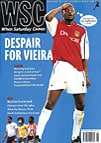 Mark Perryman discusses the need for England fans to set a good example for future generations
Mark Perryman discusses the need for England fans to set a good example for future generations
At the end of June, some 30,000 England supporters belonging to the England Members Club received a brightly coloured envelope through their letter boxes. It was a package that most had been expecting, the news that the EMC was being replaced with a new organisation.
In the aftermath of the trouble involving England fans at Euro 2000, the Home Office set up a Football Disorder Working Group. Its report of fered a broad range of conclusions, mostly good, but with little obvious sense of how they could be implemented. Looking for a quick sound-bite the principal recommendation seemed to be to scrap the EMC because it was alleged to harbour the violent, racist and xenophobic core.
Meanwhile the FA had come to their own conclusion. Simply scrapping the EMC without replacing it with something new was not an option. The club, and its predecessor the England Travel Club, had been initiated in response to the trouble that had led to English club sides being banned from European competition in the mid-Eighties. The idea was to have a means to control the distribution of tickets to England away games and in later years, particularly before and after France 98, this was accompanied by a realisation that an active relationship with England fans would be no bad thing either.
Euro 2000, however, proved to be a turning point. Accompanied by the changing regime at the FA and the closure of Wembley for home games, the need for change became more and more apparent. A lengthy consultation process began, involving meetings with fans, market research, focus groups and a membership survey. Anxieties over ticket allocations for domestic games became a huge issue.
While matches had been played at Wembley all members had been guaranteed a ticket. But with Villa Park, Anfield, Pride Park or White Hart Lane as the venue, the capacity was vastly reduced. Unless games were to become “members only” a guaranteed ticket was no longer possible. The anxiety spilled over into fears that the loyalty points system which built up from attending qualifying games and resulted in World Cup or European Championship tickets would be scrapped. A highly effective lobbying campaign, FansRedCard, was formed to oppose these feared changes. The Football Supporters Association extended their well-received Fan Embassy initiative from just the major championships to all England games and started publishing a free England fanzine, Free Lions. Would the new club be simply a merchandising operation that excluded the traditional England fan? This was the main fear of those suspicious of change.
The brightly coloured envelope will surprise many. The new organisation, England Fans, is for away supporters, it retains the loyalty points system, offers a rolling programme of fan forums, an annual members’ survey and improved travel information service.
The loyalty points system has been made more flexible, 70 per cent of tickets for away games and championships will be awarded by loyalty points, 30 per cent by ballot. And carrying over points from one campaign to another only applies to the first game. Active, not historic, loyalty is rewarded, making it easier for a new fan to get away tickets while securing a place at the front of the queue for finals tickets for those who have trekked all over Europe through the qualifiers.
On the security front a much more comprehensive vetting process has been introduced. Joining the club gives the FA the right to access a member’s criminal record. A range of offences committed within three years of joining will disbar applicants from membership. Any who are excluded on these grounds have the right to appeal to an independent panel if they believe the information is incorrect.
Will this result in a more positive England fan culture? Munich in September will surely be too early to come to any proper assessment, and the particular circumstances of this game would make any snap decision in the light of any trouble particularly unwise. So far trips to Helsinki, Tirana and Athens have been almost without incident.
England Fans will have to reach out not only to current England away supporters but also to those who haven’t yet travelled, and actively recruit those who have felt excluded by what they feel England away represents. Many will be those who support England at home, live or on the TV, and it is surely a missed opportunuity therefore not to offer these many hundreds of thousands a way of “belonging” too – the World Cup finals in Japan and Korea would be a good time to launch that if England get there. But if England Fans can help get things right away from home it will be a start. Shiny new repackaging is the beginning, the success or failure remains in the hands of the fans.
From WSC 174 August 2001. What was happening this month